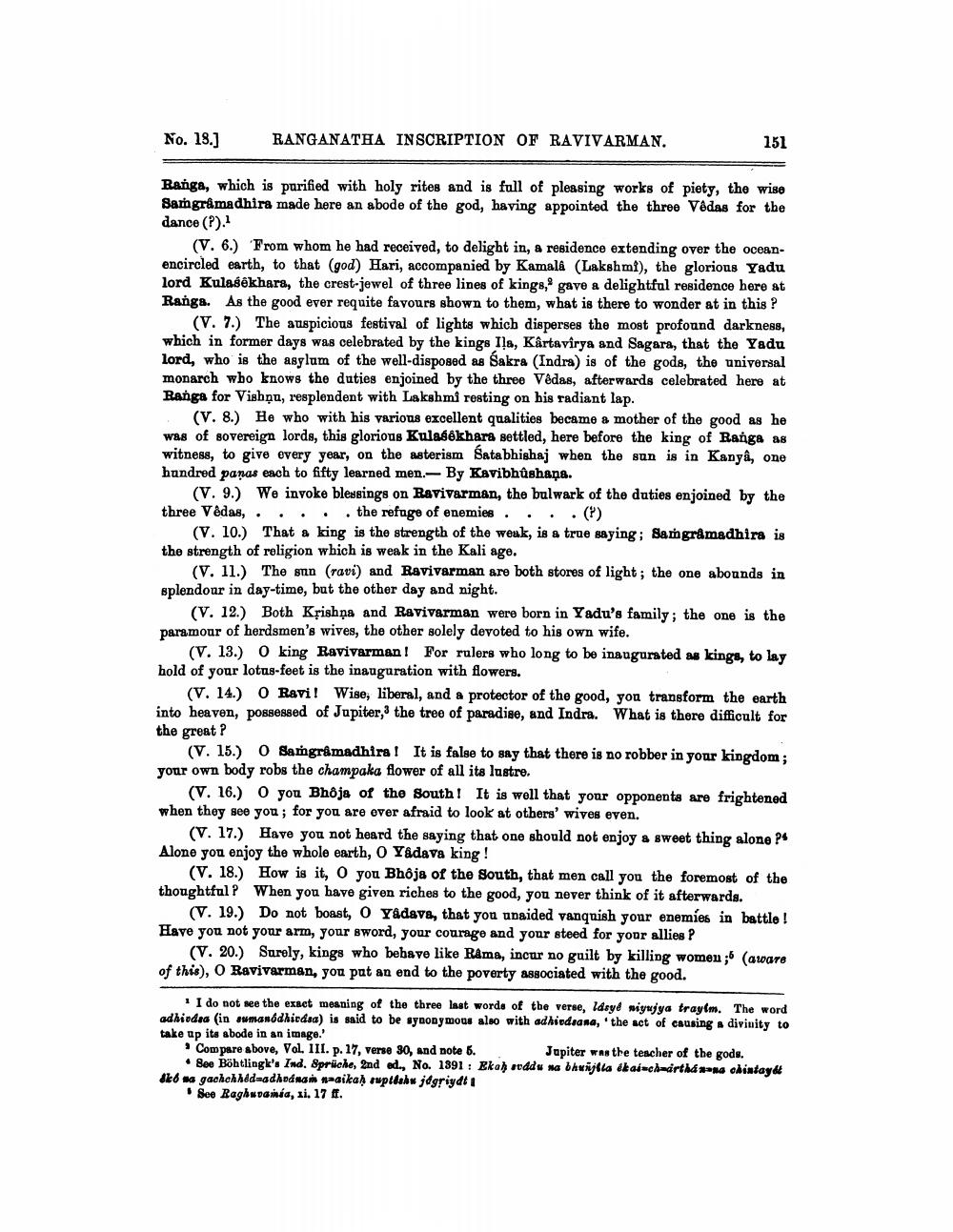________________
No. 18.]
RANGANATHA INSCRIPTION OF RAVIVARMAN.
151
Ranga, which is purified with holy rites and is full of pleasing works of piety, the wise Samgramadhira made here an abode of the god, having appointed the three Vedas for the dance (?).
(V. 6.) From whom he had received, to delight in, a residence extending over the oceanencircled earth, to that (god) Hari, accompanied by Kamala (Lakshmi), the glorious Yadu lord Kulasekhara, the crest-jewel of three lines of kings, gave a delightful residence here at Ranga. As the good ever requite favours shown to them, what is there to wonder at in this ?
(V. 7.) The auspicious festival of lights which disperses the most profound darkness, which in former days was celebrated by the kings I!s, Kârtavirya and Sagara, that the Yadu lord, who is the asylum of the well-disposed as Sakra (Indra) is of the gods, the universal monarch who knows the duties enjoined by the three Vêdas, afterwards celebrated here at Ranga for Vishạn, resplendent with Lakshmi resting on his radiant lap.
(V. 8.) He who with his varions excellent qualities became a mother of the good as he was of sovereign lords, this glorious Kulasekhara settled, here before the king of Ranga as witness, to give every year, on the asterism Satabhishaj when the sun is in Kanya, one hundred paņas each to fifty learned men.- By Kavibhushana.
(V. 9.) We invoke blessings on Revivarman, the bulwark of the duties enjoined by the three Vedas, . . . . . the refuge of enemies . . . . (*)
(V. 10.) That a king is the strength of the weak, is a true saying; Samgramadhira is the strength of religion which is weak in the Kali age.
(V. 11.) The sun (ravi) and Ravivarman are both stores of light; the one abounds in splendoar in day-time, but the other day and night.
(V. 12.) Both Krishṇa and Ravivarman were born in Yadu's family; the one is the paramour of herdsmen's wives, the other solely devoted to his own wife.
(V. 13.) Oking Ravivarman! For rulers who long to be inaugurated as kings, to lay hold of your lotus-feet is the inauguration with flowers.
(V. 14.) O Revi! Wise, liberal, and a protector of the good, you transform the earth into heaven, possessed of Jupiter, the tree of paradise, and Indra. What is there difficult for the great ?
(V. 15.) 0 Samgramadhira! It is false to say that there is no robber in your kingdom; your own body robs the champaka flower of all its lustre,
(V. 16.) O you Bhoja of the South! It is well that your opponents are frightened when they see you; for you are over afraid to look at others' wives even.
(V. 17.) Have you not heard the saying that one should not enjoy & sweet thing alone ? Alone you enjoy the whole earth, 0 Yadava king!
(V. 18.) How is it, o you Bhojs of the South, that men call you the foremost of the thoughtful? When you have given riches to the good, you never think of it afterwards.
(V. 19.) Do not boast, O Yadave, that you upaided vanquish your enemies in battle! Have you not your arm, your sword, your courage and your steed for your allies P
(V. 20.) Surely, kings who bebave like Rama, incur no guilt by killing women ;6 (aware of this), O Ravivarman, you put an end to the poverty associated with the good.
11 do not see the exact meaning of the three laat words of the verse, Idsye siyujya trayem. The word adhiodea (in sumasodhitása) is said to be synonymous also with ad indiana, 'the act of causing a divinity to take up its abode in an image.' Compare above, Vol. III. p. 17, verse 80, and note 6.
Jupiter was the teacher of the gods. • Bee Böhtlingk's Ind. Sprüche, 2nd ed., No. 1891 : Ekan ruddu na bhuilla kas=chearthana chintay 816 na gachchhddeadhodna praikaḥ ruptbahu jdgriydt
See Raghupama, ii, 17 ff.




